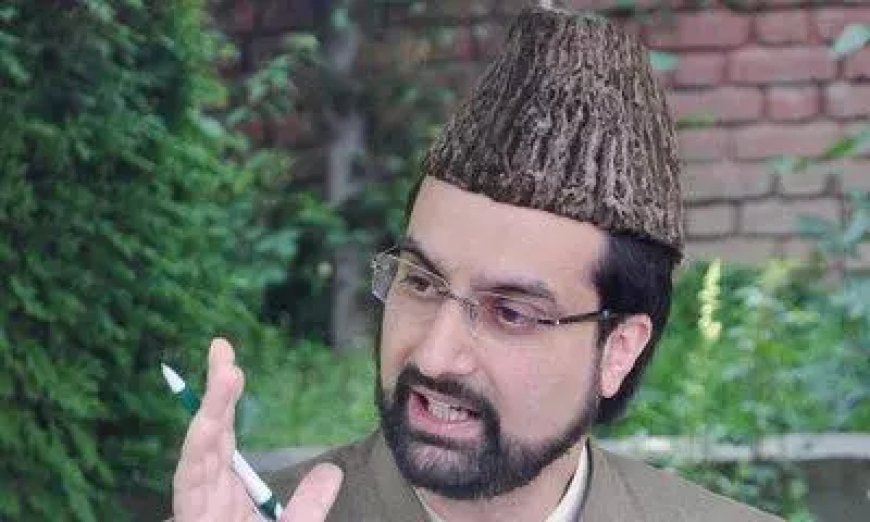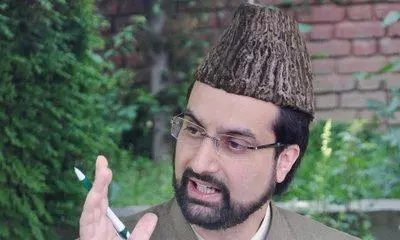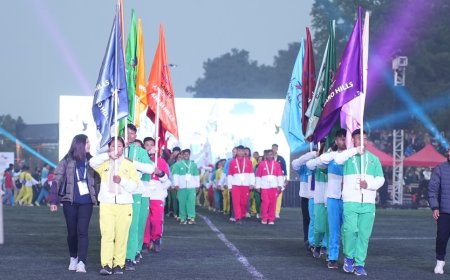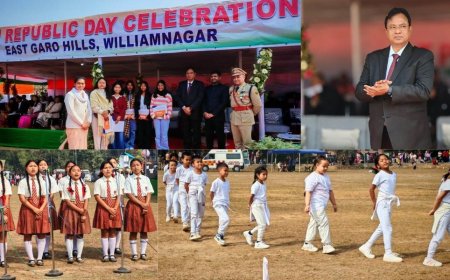Centre-Hurriyat Dialogue Likely; Backchannel Contacts Helping in Breaking Ice
Srinagar: As the backchannel contacts between the two sides have led to some melting of the ice, there is every likelihood of the Centre’s resuming peace dialogue with the Kashmiri separatists, the engagement which was being weighed down by anxiety about outcomes given the BJP’s pro-active strategies vis-à-vis Jammu and Kashmir. But now the Centre is reportedly willing to “enlarge the constituency of peace” by reengaging the Hurriyat Conference led by Kashmir’s key religious and political leader Mirwaiz Umar Farooq in a sustained and meaningful dialogue, reliable sources said. The Narendra Modi government has decided to slightly retreat from its hardline posture owing to the “change of heart” in the influential Kashmiri separatist leadership and its “realising the futility of confrontation and disagreement”, the sources said. The Centre’s strategy appears to have underscored the urgency of a review also in view of the changed post-assembly poll political ambiances in J&K. A BJP leader who spoke to this newspaper on condition of anonymity said the Centre may provide political space to a few separatist leaders and hold open talks with the Mirwaiz-led Hurriyat Conference “because of a positive shift in their mindset”. He referred to a recent viral video of the Hurriyat Conference executive member and former chairman Prof. Abdul Gani Bhat in which he categorically states that the political movement spearheaded by the Kashmiri separatists was “directionless” and that it had only harmed the interests of the people of J&K. The BJP leader also saw the probable engagement as a mechanism to “contain the divisive forces and achieve bigger goals.” He, however, refused to spell out these “bigger goals” or identify the “divisive forces” that can be fought against by engaging the Hurriyat Conference in dialogue. A Hurriyat Conference leader while responding to a query on the reported behind-the-scenes engagement with the Centre said that back-channel negotiations are commonplace in peace negotiations and serve as crucial mechanisms for reaching agreements. He also said that the Hurriyat Conference was never against addressing the issues through dialogue. He said that the Mirwaiz-led Hurriyat Conference had wholeheartedly participated in the two-way dialogue initiated by the then Prime Minister Atal Bihari Vajpayee in the spirit of his mantra of '‘Insaniyat, Jamhooriyat and Kashmiriyat’ (humanity, democracy and Kashmiriyat- the ethno-national and social consciousness and cultural values of the Kashmiri people)”. The talks, however, could not be taken to their logical conclusion as the BJP lost the 2009 Lok Sabha elections and the Congress which came into power could not take that process forward, he said. “Some of the national and state Congress leaders had then publicly stated that the new government will follow a similar approach and facilitate and help initiate a sustained and meaningful dialogue with all internal stakeholders including the Hurriyat Conference, but it repudiated from the promise and after one or two initial meetings between our leadership and Prime Minister Manmohan Singh no further positive steps were taken,” he said. The Mirwaiz had, some time ago, told this newspaper in an interview that the Manmohan Singh government had had many opportunities to engage and to talk. “The last meeting we had with the Prime Minister was way back in 2007 at which we gave some suggestions and proposals to the Government of India. But nothing has moved. Not a single suggestion or the proposal the Hurriyat gave was accepted or worked upon,” he had said. “(Prime Minister) Manmohan Singh had, at least, six years of power where he could have consolidated that process, he could have engaged with the Kashmiris and Pakistan to take the process forward,” he had said, adding, “One must say that the credit has to be given where it is due. When Mr. Vajpayee was the Prime Minister, he talked about shedding the beaten track. He talked about the ambit of humanity. Those were the words which gave a large meaning to India's policy regarding Kashmir”. The local political watches say that though Mr. Modi after taking over as the Prime Minister in 2014 publicly spoke about reverting to the Vajpayee initiative but the essence of his message of 'Insaniyat, Jamhooriyat and Kashmiriyat’ remained missing. “The ground situation particularly the unrest triggered by the killing of Hizb-ul-Mujahideen commander Burhan Wani played a spoilsport and led to New Delhi’s hardening its attitude. The Centre’s August 5, 2019 moves completely changed J&K’s political scenario,” said analyst Vajeh Ahmed. He added, “We must admit there were missed opportunities from the other (separatists) side also prior to August 2019.”


Srinagar: As the backchannel contacts between the two sides have led to some melting of the ice, there is every likelihood of the Centre’s resuming peace dialogue with the Kashmiri separatists, the engagement which was being weighed down by anxiety about outcomes given the BJP’s pro-active strategies vis-à-vis Jammu and Kashmir.
But now the Centre is reportedly willing to “enlarge the constituency of peace” by reengaging the Hurriyat Conference led by Kashmir’s key religious and political leader Mirwaiz Umar Farooq in a sustained and meaningful dialogue, reliable sources said.
The Narendra Modi government has decided to slightly retreat from its hardline posture owing to the “change of heart” in the influential Kashmiri separatist leadership and its “realising the futility of confrontation and disagreement”, the sources said. The Centre’s strategy appears to have underscored the urgency of a review also in view of the changed post-assembly poll political ambiances in J&K.
A BJP leader who spoke to this newspaper on condition of anonymity said the Centre may provide political space to a few separatist leaders and hold open talks with the Mirwaiz-led Hurriyat Conference “because of a positive shift in their mindset”. He referred to a recent viral video of the Hurriyat Conference executive member and former chairman Prof. Abdul Gani Bhat in which he categorically states that the political movement spearheaded by the Kashmiri separatists was “directionless” and that it had only harmed the interests of the people of J&K.
The BJP leader also saw the probable engagement as a mechanism to “contain the divisive forces and achieve bigger goals.” He, however, refused to spell out these “bigger goals” or identify the “divisive forces” that can be fought against by engaging the Hurriyat Conference in dialogue.
A Hurriyat Conference leader while responding to a query on the reported behind-the-scenes engagement with the Centre said that back-channel negotiations are commonplace in peace negotiations and serve as crucial mechanisms for reaching agreements. He also said that the Hurriyat Conference was never against addressing the issues through dialogue.
He said that the Mirwaiz-led Hurriyat Conference had wholeheartedly participated in the two-way dialogue initiated by the then Prime Minister Atal Bihari Vajpayee in the spirit of his mantra of '‘Insaniyat, Jamhooriyat and Kashmiriyat’ (humanity, democracy and Kashmiriyat- the ethno-national and social consciousness and cultural values of the Kashmiri people)”.
The talks, however, could not be taken to their logical conclusion as the BJP lost the 2009 Lok Sabha elections and the Congress which came into power could not take that process forward, he said. “Some of the national and state Congress leaders had then publicly stated that the new government will follow a similar approach and facilitate and help initiate a sustained and meaningful dialogue with all internal stakeholders including the Hurriyat Conference, but it repudiated from the promise and after one or two initial meetings between our leadership and Prime Minister Manmohan Singh no further positive steps were taken,” he said.
The Mirwaiz had, some time ago, told this newspaper in an interview that the Manmohan Singh government had had many opportunities to engage and to talk. “The last meeting we had with the Prime Minister was way back in 2007 at which we gave some suggestions and proposals to the Government of India. But nothing has moved. Not a single suggestion or the proposal the Hurriyat gave was accepted or worked upon,” he had said.
“(Prime Minister) Manmohan Singh had, at least, six years of power where he could have consolidated that process, he could have engaged with the Kashmiris and Pakistan to take the process forward,” he had said, adding, “One must say that the credit has to be given where it is due. When Mr. Vajpayee was the Prime Minister, he talked about shedding the beaten track. He talked about the ambit of humanity. Those were the words which gave a large meaning to India's policy regarding Kashmir”.
The local political watches say that though Mr. Modi after taking over as the Prime Minister in 2014 publicly spoke about reverting to the Vajpayee initiative but the essence of his message of 'Insaniyat, Jamhooriyat and Kashmiriyat’ remained missing.
“The ground situation particularly the unrest triggered by the killing of Hizb-ul-Mujahideen commander Burhan Wani played a spoilsport and led to New Delhi’s hardening its attitude. The Centre’s August 5, 2019 moves completely changed J&K’s political scenario,” said analyst Vajeh Ahmed. He added, “We must admit there were missed opportunities from the other (separatists) side also prior to August 2019.”






































